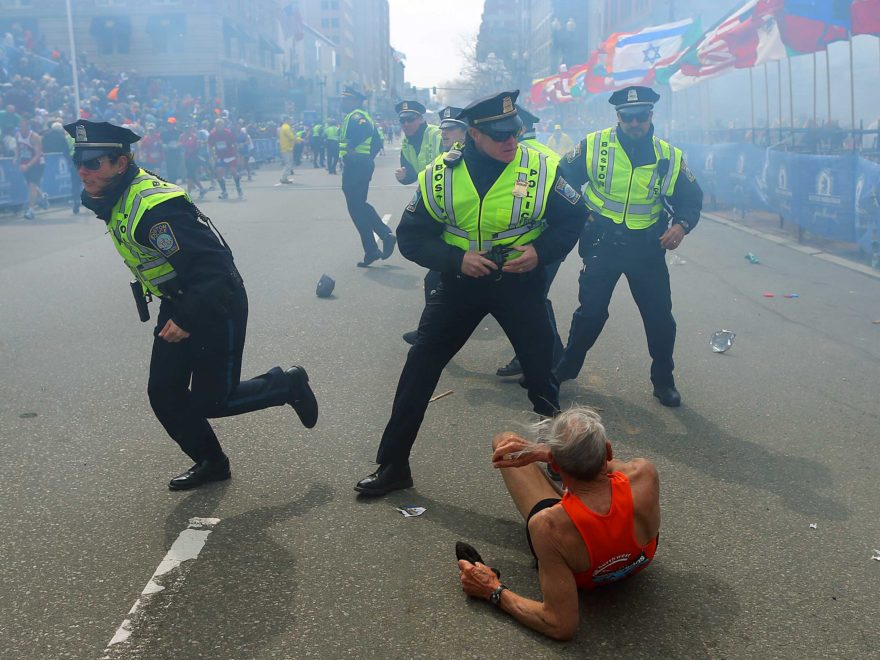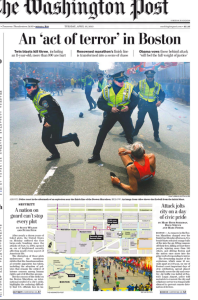Marathon bomb WPost16 Apr 2013
16 Apr 2013
The Washington Post
BY MARY BETH SHERIDAN, DOUG STRUCK AND MARC FISHER
Attack jolts city on a day of civic pride
“Unfortunately, it brought back all the memories of 9/11.”
Deborah Capko, 49, a breast cancer surgeon who had just crossed the finish line when she heard the explosions
The devastating impact of the explosions, which came 16 seconds apart at 2:50 p.m. on one of Boston’s most important days of civic celebration, spread almost instantly across the city and country: Air traffic was halted at Boston’s Logan Airport, police told motorists to evacuate the city, and cellphone service was temporarily silenced to prevent remote detonation of devices. An 8-year-old boy was killed and at least 10 other children were among the injured, according to law enforcement officials. Medical personnel said many people suffered from shrapnel-type injuries in their legs, though they were uncertain whether the metal pieces were embedded in the bombs or were blast debris.
“We still do not know who did this or why, and people shouldn’t jump to conclusions before we have all the facts,” President Obama said in a brief statement after 6 p.m. “But make no mistake: We will get to the bottom of this,” and whoever is responsible “will feel the full weight of justice.”
Federal authorities were treating the explosions as a terrorist attack. Richard DesLauriers, special agent in charge of the FBI office in Boston, said the investigation is being led by a joint terrorism task force made up of federal, state and local authorities. “It is a criminal investigation that is a potential terrorist investigation,” he said at an evening news conference.
On Boylston Street, where moments earlier runners consumed by exhaustion and joy had embraced friends and family, blood was streaked across sidewalks and the street. Witnesses saw detached limbs in the gutter. Volunteers turned into impromptu emergency squads, loading the wounded onto boards. A cook tied his apron around the stump of a woman whose leg was severed.
There were so many injuries that first responders had to use lanyards as tourniquets. Marathon runners halted, then ran again, this time with no destination but for an elusive place they could call safe.
At an afternoon news conference, Boston Police Commissioner Ed Davis said the explosions caused “multiple” casualties, but he gave no details. Officials said more than 130 people were injured.
Police said the bombs had been placed in trash cans, less than 100 yards apart. Unconfirmed reports said the explosions were triggered by remote control. Officials said police found at least two suspicious packages at other downtown locations, including a footbridge near the Copley Plaza Hotel.
Davis said he could not say whether the bombs were a terrorist attack, then added, “You can reach your own conclusion based on what happened.” In Washington, Senate Intelligence Committee Chairman Dianne Feinstein (D-Calif.) said she believes the bombings constitute a terrorist attack, but she based her judgment on news reports, not on official intelligence.
Sen. Susan Collins (R-Maine) said her staff had been told by the National Counterterrorism Center that there was no specific warning of the Boston attacks. Collins also concluded that “this attack bears all the hallmarks of a terrorist attack.”
News reports in Boston said a surveillance photo showed a man with two backpacks at the scene shortly before the explosions. Davis said Monday night that there were no suspects, but the police were talking to some people.
Allan Kaufman, 54, of Manchester, N.H., was on Boylston Street watching the marathon when the bombs went off. He turned away when he saw body parts on the sidewalk. “We can’t do this anymore. We can’t have open events anymore,” he said. “You can’t control it.”
The explosions ripped into an idyllic afternoon finish for the marathon. The first men had passed the finish line 2 hours and 10 minutes after the staggered start, and the first women crossed 16 minutes later. But at 2:50 p.m., a bulge of slower runners converged on the finish line, which was marked by a string of colorful flags from countries represented by the racers.
The first blast sent oddly gentle puffs of white smoke two stories high. Runners stopped in their tracks. After the second blast half a block away, the news reverberated back through the line of runners like a Slinky toy.
“I was two kilometers away,” said Michael Johnstone, 57, a runner from Newton, Mass. “I suddenly noticed people in suits and other clothes on the street going the other way. I thought it was a breakdown in security, but then we were stopped.”
The bombings came on a state holiday that recalls the first battles of the American Revolution and brings Bostonians together for their world-famous marathon and an early Red Sox game at Fenway Park. Patriots’ Day — with no connection to the national Patriot Day that marks each Sept. 11 in memory of those killed in the 2001 attacks — “is the city at its best,” said Paul Grogan, president of the Boston Foundation, a civic group. “It just makes me sick and very sad that if someone did this, that they selected this iconic event, which is Boston at its best, America at its best, to perpetrate this act.”
Many Boston shops and schools were closed Monday, and many people who were off from work were out on the city’s streets. The final mile of the race was dedicated this year to victims of December’s school shootings in Newtown, Conn., and some relatives of children who died that day were in attendance.
Many spectators clustered near the finish line. About four hours into the race, Tammy Crago, 49, a teacher from York, S.C., was waiting to see her mother cross the line when she heard what sounded like a cannon boom.
“I looked at Dad and said, ‘What the hell is that?’ ” Crago said. Then another boom rang out, this one just a few feet away. “Everyone started yelling ‘Bomb!’ ” Windows shattered and white smoke filled the street.
Crago, her brother and her father broke into a run. “I saw part of a man laying on the sidewalk in front of the Starbucks,” Crago said, her eyes welling. “There were runners on the ground, too.”
The family dashed into a nearby restaurant, by then jammed with panicked people. After a few minutes, authorities ushered everyone out the back door. “They said to run,” Crago said.
Workers from a nearby medical tent dashed to help victims, witnesses said. Volunteers jumped over tables piled with Gatorade bottles to attend to the wounded. Race officials yelled at bystanders to flee, saying there was a third bomb that had not exploded. “Keep moving, keep moving,” volunteers said. “Don’t panic.”
For hours, reports of bombs, threats and scares sent SWAT teams and police scrambling across the city, to universities, hotels and the JFK Library, where officials said a fire was not related to the explosions. Apartment buildings, hotels and offices were evacuated.
A bomb squad exploded an unknown object found near the Boston Public Library. The police radio crackled with reports of fires and explosions. The city’s core was shut down, and buses cordoned off major streets. Police took to loudspeakers to tell motorists to “evacuate the city.” Long lines of ambulances queued outside some of the city’s finest hotels.
Security was tightened not only in Boston but in Manhattan and at several Washington locations, including on Capitol Hill and in front of the White House.
In the District, Mayor Vincent C. Gray urged residents to go ahead Tuesday with plans to celebrate Emancipation Day, which commemorates Abraham Lincoln’s 1862 signing of a bill freeing the city’s slaves. Plans call for a morning parade down Pennsylvania Avenue NW, a gospel concert and a fireworks show, and Police Chief Cathy L. Lanier said security would be tight.
In Boston, security at the marathon was carefully planned; hundreds of police officers and other emergency workers lined the route. But the 26.2-mile course is by definition open and sprawling, stretching through the city and its neighboring towns.
By the time runners reached Boylston Street, they thought the rough part of the day was behind them. Deborah Capko, 49, a breast cancer surgeon at the Memorial Sloan-Kettering Cancer Center running in her first Boston Marathon, had just crossed the finish line and taken her first few sips at the water tent when she heard the explosions. “You had little doubt what it was,” she said. “Unfortunately, it brought back all the memories of 9/11.”
Capko’s first thought was to retrieve her phone from the storage depot and call her family. She kept dialing without luck. Finally, her husband, John Cambria, reached her. “Are you okay?” he asked.
At last, he heard her voice: “I’m fine. I’m fine.”
They met near Boston Common, where hundreds of police and National Guardsmen gathered. They passed many others frantically looking for loved ones.
Runners retreated, then searched for the bags holding their street clothes, which were kept on buses near the finish line. Police shooed them away, leaving runners shivering in their shorts in Boston’s historic Public Garden.
For those who had trained for months or years to run the marathon, the abrupt end of the race was as disturbing as it was tragic.
Ruediger Korbel, 53, a professor of veterinary medicine from Munich, crossed the finish line about a minute before the first bomb went off. Hours later, his ears were still ringing from the concussive force. He had been basking in the enthusiasm of the crowds as he ran his first Boston race.
“It was this massive positive feeling on the one hand, and then — boom! Boom!” And suddenly, running a race seemed trite. “Finishing the marathon — it’s nothing,” he said. “It’s not possible to be happy about this.”
Late Monday night, Peter G. Fagan, a trauma surgeon at Massachusetts General Hospital, told reporters that 29 people had been brought to the hospital and many were in critical condition. He said most of the injuries involved metal pieces that had damaged lower extremities. Many victims, he said, had legs amputated.

